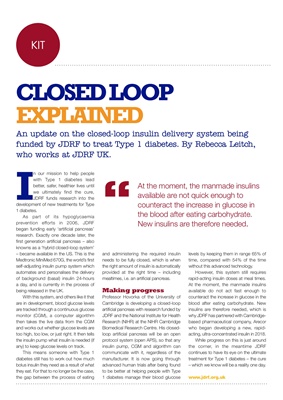
KIT
I
n our mission to help people
with Type 1 diabetes lead
better, safer, healthier lives until
we ultimately find the cure,
JDRF funds research into the
development of new treatments for Type
1 diabetes.
As part of its hypoglycaemia
prevention efforts in 2006, JDRF
began funding early 'artificial pancreas'
research. Exactly one decade later, the
first generation artificial pancreas - also
knowns as a 'hybrid closed-loop system'
- became available in the US. This is the
Medtronic MiniMed 670G, the world's first
self-adjusting insulin pump system which
automates and personalises the delivery
of background (basal) insulin 24-hours a
day, and is due for commercial release in
the UK in 2019.
With these systems, blood glucose
levels are tracked through a continuous
glucose monitor (CGM). A computer
algorithm then takes the live data from
the CGM and works out whether glucose
levels are too high, too low, or just right,
and then tells an insulin pump what is
needed to keep glucose levels on track.
This means someone with Type 1
diabetes still has to work out how much
bolus insulin they need as a result of
what they eat. For that to no longer be
the case, the gap between the process
of eating and administering the required
CLOSED LOOP
EXPLAINED
An update on the closed-loop insulin delivery system being
funded by JDRF to treat Type 1 diabetes. By Rebecca Leitch,
who works at JDRF UK.
insulin needs to be fully closed, which
is when the right amount of insulin is
automatically provided at the right time -
including mealtimes.
Making progress
Professor Hovorka of the University of
Cambridge is developing a closed-loop
artificial pancreas with research funded by
JDRF and the National Institute for Health
Research (NIHR) at the NIHR Cambridge
Biomedical Research Centre.
His closed-loop artificial pancreas
will be an open protocol system (open
APS), so that any insulin pump, CGM
and algorithm can communicate with it,
regardless of the manufacturer. It is now
going through advanced human trials
after being found to be better at helping
people with Type 1 diabetes manage their
blood glucose levels by keeping them in
range 65% of time, compared with 54%
of the time without the technology.
However, this system still requires
rapid-acting insulin doses at meal
times. At the moment, the manmade
insulins available are not quick enough
to counteract the increase in glucose
in the blood after eating carbohydrate.
New insulins are therefore needed,
which is why JDRF has partnered with
Cambridge-based pharmaceutical
company, Arecor who began developing
a new, rapid-acting, ultra-concentrated
insulin in 2018.
But while progress on this is just
around the corner, JDRF continues to
have its eye on the ultimate treatment for
Type 1 diabetes - the cure - which we
know will be a reality one day.
www.jdrf.org.uk
"At the moment, the manmade insulins
available are not quick enough to
counteract the increase in glucose in
the blood after eating carbohydrate.
New insulins are therefore needed.